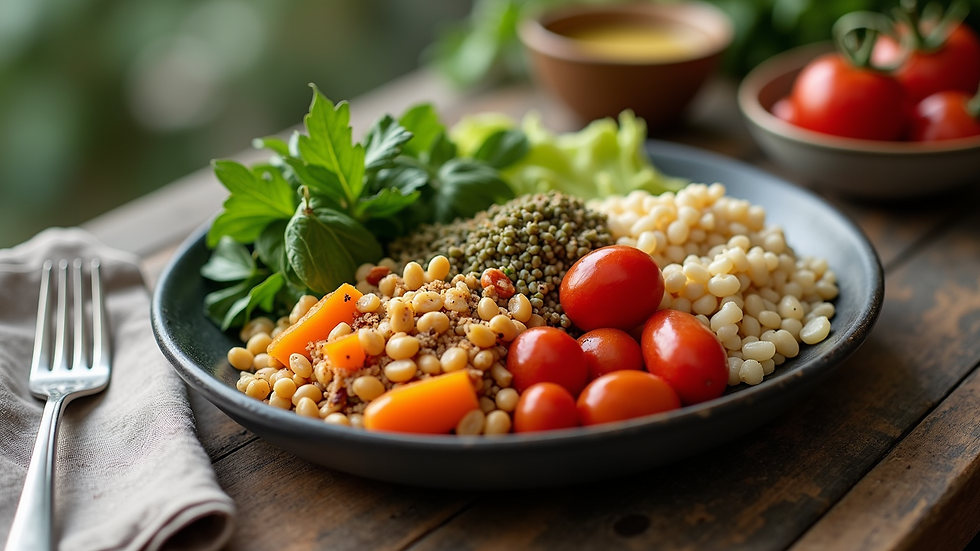Foods That Help Heal Anal Fissures
- Dr Arnab Ray

- Sep 4, 2025
- 3 min read
Anal fissures cause pain and discomfort. Healing them requires care and attention to diet. What you eat can make a big difference. Certain foods help soothe and repair the delicate skin around the anus. Others may worsen the condition. I will guide you through the best foods to include in your diet to support healing.
Healing Foods for Fissures: What to Eat
Eating the right foods helps keep stools soft and easy to pass. This reduces strain and irritation on the fissure. Here are some key foods to focus on:
High-fibre fruits and vegetables: Apples, pears, carrots, and leafy greens add bulk to stool. They help prevent constipation.
Whole grains: Brown rice, oats, and whole wheat bread provide fibre and nutrients.
Legumes: Lentils, chickpeas, and beans are rich in fibre and protein.
Healthy fats: Olive oil and avocado support skin health and reduce inflammation.
Plenty of water: Staying hydrated softens stools and aids digestion.
Including these foods regularly can speed up healing. Avoid processed foods and those low in fibre. They can cause hard stools and worsen fissures.

How Fibre Helps Heal Anal Fissures
Fibre is the most important nutrient for healing fissures. It adds bulk to stool and helps it pass smoothly. There are two types of fibre:
Soluble fibre: Found in oats, apples, and beans. It absorbs water and forms a gel-like stool.
Insoluble fibre: Found in whole grains and vegetables. It adds bulk and speeds up stool movement.
Both types are essential. Aim for 25-30 grams of fibre daily. Increase fibre intake gradually to avoid gas or bloating. Pair fibre with plenty of water for best results.
Fibre also supports gut health by feeding good bacteria. This improves digestion and reduces inflammation around the fissure.
Can I Eat Milk in a Fissure?
Milk and dairy products can affect people differently. Some find that milk causes constipation or hard stools. This can worsen fissures. Others tolerate milk well without issues.
If you notice milk makes your stools harder or causes discomfort, try reducing or avoiding it. You can replace cow’s milk with plant-based alternatives like almond or oat milk. These are often easier to digest.
If you tolerate milk well, continue to include it as a source of calcium and protein. Just watch how your body reacts and adjust accordingly.

Foods to Avoid When Healing Anal Fissures
Certain foods can irritate the fissure or cause constipation. Avoid these to support healing:
Spicy foods: They can cause burning and discomfort.
Processed and fast foods: Low in fibre and high in unhealthy fats.
Caffeine and alcohol: These can dehydrate you and harden stools.
Red meat: Hard to digest and may cause constipation.
Refined sugars and white bread: Low in fibre and can worsen bowel movements.
Focus on natural, whole foods. This helps reduce inflammation and promotes faster healing.
Practical Tips for a Healing Diet
Here are some simple steps to follow:
Start your day with a high-fibre breakfast like oatmeal with fruit.
Include vegetables in every meal.
Snack on nuts, seeds, or fresh fruit.
Drink at least 8 glasses of water daily.
Avoid straining during bowel movements.
Consider a fibre supplement if you struggle to get enough from food.
If you want more detailed guidance, check out this diet for anal fissures resource.

Supporting Healing with Ayurvedic Care
Ayurvedic medicine offers natural treatments for fissures. Along with diet, herbal remedies and therapies can reduce pain and speed recovery. Dr. Arnab Ray in Kolkata specialises in Ayurvedic proctology. His approach combines diet, lifestyle changes, and Ayurvedic surgery when needed.
If you suffer from benign anorectal conditions like fissures, piles, or fistula, consider consulting an expert. Combining the right foods with professional care gives you the best chance of healing fully and comfortably.
Eating the right foods plays a vital role in healing anal fissures. Focus on fibre-rich fruits, vegetables, whole grains, and healthy fats. Avoid irritants and stay hydrated. With patience and care, you can ease pain and support your body’s natural healing process.








Comments